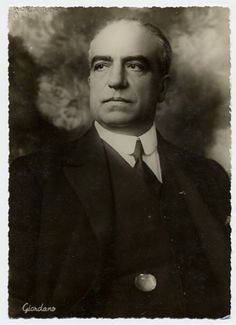- Profession: Composer.
- Residences: Foggia.
- Relation to Mahler:
- Correspondence with Mahler: Yes.
- 00-05-1900, Year 1900. To Justine (Ernestine) Rose-Mahler (1868-1938) .
- 00-07-1900, Year 1900.
- Born: 28-08-1867 Foggia, Italy.
- Died: 12-11-1948 Milan, Italy. Aged 81.
- Buried: Monumentale cemetery, Milan, Italy.
Umberto Menotti Maria Giordano was an Italian composer, mainly of operas. He was born in Foggia in Apulia, southern Italy, and studied under Paolo Serrao at the Conservatoire of Naples. His first opera, Marina, was written for a competition promoted by the music publishers Casa Sonzogno for the best one-act opera, remembered today because it marked the beginning of Italian verismo; the winner was Mascagni’s Cavalleria rusticana. Giordano, the youngest contestant, was placed sixth among seventy-three entries with his Marina, a work which generated enough interest for Sonzogno to commission the staging of an opera based on it in the 1891/1892 season.
The result was Mala Vita, a gritty verismo opera about a labourer who vows to reform a prostitute if he is cured of his tuberculosis. This work caused something of a scandal when performed at the Teatro Argentina, Rome, in February 1892. It played successfully in Vienna, Prague, and Berlin, and was re-written as Il Voto a few years later, in an attempt to raise interest in the work again.
Giordano tried a more romantic topic with his next opera, Regina Diaz, with a libretto by Giovanni Targioni-Tozzetti and Guido Menasci (1894), but this was a failure, taken off the stage after just two performances.
Giordano then moved to Milan and returned to verismo with his best-known work, Andrea Chénier (1896), based on the life of the French poet André Chénier. Fedora (1898), based on Victorien Sardou’s play, featured a rising young tenor named Enrico Caruso; it was also a success, and is still performed today. His later works are much less known, but occasionally revived and in the case of La cena delle beffe (based on the play of the same title by Sem Benelli) recognised by musicologists and critics with some respect.
The most important theater in his home town of Foggia has been dedicated to Umberto Giordano. A square in Foggia is also named after him and contains several statues representing his most famous works.
More
Composer. A leader of the “verismo”, or “realistic” movement of Italian opera. His music is notable for its vigorous melodies and dramatic effectiveness. He is best known for “Andrea Chenier” (1896). Giordano was born in Foggia, Italy. He became a musician against his father’s wishes and studied rather erratically at the Naples Conservatory between 1880 and 1890, supporting himself as a stagehand.
In 1889 he entered a competition for a one-act opera sponsored by the publisher Sonzogno; he lost to Mascagni’s landmark “Cavalleria Rusticana”, but was deemed promising enough to receive a contract. His first official stage work, “Mala Vita” (1892), provoked a riot with its grim story of prostitution and his second, “Regina Diaz” (1894), closed after two performances. Only Mascagni’s intervention persuaded Sonzogno to give the composer one more chance.
The result was Giordano’s masterpiece, “Andrea Chenier”. Based on the life of the 18th Century French poet, who was guillotined during the Reign of Terror, it immediately entered the world repertory and has never left it. Its arias “Un di all’azzurro spazio”, “Si, fui soldato”, “Come un bel di di maggio”, and “La mama morta” are still popular recital pieces.
He had another smash with “Fedora” (1898), which brought stardom to an unknown tenor, Enrico Caruso. Giordano later attributed the singer’s success to his personal coaching in vocal technique, claiming “I made a new Caruso out of him”. Of his seven other operas only “Siberia” (1903) and the comedy “Il Re” (1929) enjoyed fleeting popularity. He died in Milan. Fascinated with recording technology, Giordano was a co-founder of the Discoteca di Stato, Italy’s principal archive of historical recordings. A theatre and a square in his native Foggia are named for him.



